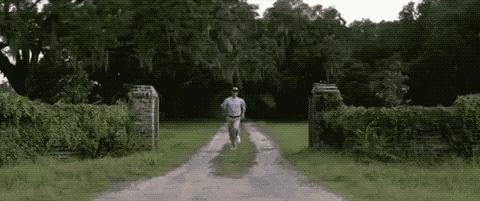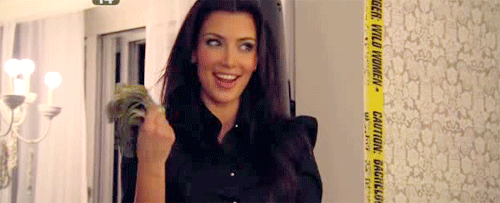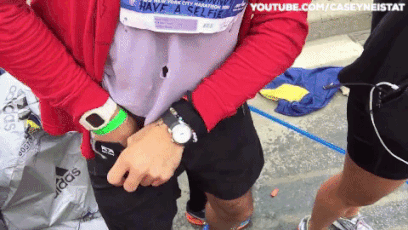 |
| Advertisement |
If you’re training for your first marathon — or even if you’re not — here’s what I learned while training for this very, very long race.
Heyo, my name is Hal. Last November, I ran my first marathon. And now that my knees have recovered and I'm still alive, I'm ready to tell you about the last year's worth of training for the New York City Marathon.

If you look closely, you can see that I am eating pretzels and also I am in pain.
Plot twist: Before I started training for the TCS New York Marathon, I had never run more than a few miles at a time.
Exercising, especially running, was not my friend. Ever. I have always been jealous of people who say things like, "I think I am going to go for a run this afternoon!" or, "Who wants to play a quick pickup game of soccer?"
Yeah, that's not me.
For reference, this IS me:
Hal Rhorer / Via Instagram: @halrhorer
In this photo, you will see me and a large ice cream cone.
To me, exercising was a chore, and nobody likes doing chores. So, I just avoided it at all costs.
At this point, you have to be wondering why I decided to train for and run a marathon, which is 26.2 grueling miles long.
Well, for 2 years in a row, my roommate and I went to the marathon to watch and cheer on the runners.
So, after two years of standing on the sidelines of the race, I decided that 2017 was my year. I was going to run the marathon.

Hal Rhorer / BuzzFeed
But hear me out here: Just because I finished running a marathon does not mean that I am a running expert. Far from it, actually. I made mistakes and learned some lessons along the way.

Here I am, learning a very important lesson.
And here are the lessons that I learned while training for a marathon.
Hal Rhorer / BuzzFeed
Get good shoes early.

I like my ankles, and I like when they work well. If you start running 10 miles a week out of nowhere, and you are running in the shoes that you still have from college, your ankles are not going to like you. Vinnie, a coach at Mile High Run Club here in New York, told me that you should change shoes after about 400-500 miles of running. He also suggested going to your local running shop and talking to an expert. Do this early in your training — you don't want to injure yourself before you even get started.
Paramount Pictures
Training is rewarding, but also it's a sacrifice.

Sometimes (most of the time), waking up early in the morning to go for a long run is no fun. Sometimes you have to skip out on fun things like brunch or after-work drinks so you can get a workout in. Saying no to things that I would have usually loved to do was hard, and I didn't like to do it. But, once you run your first 5 miler or achieve a pace that feels good for your body, skipping out on a happy hour will be worth it.
Hal Rhorer / BuzzFeed
I talked to my friend Aaron who ran the marathon two years before me. He was so helpful and calmed my nerves. He also told me that he crawled for the two days following the marathon. Aaron was helpful. Find your Aaron.
Who? Weekly / Via itunes.apple.com
I didn't learn this until it was too late. Sidewalks are flat, roads are slanted for drainage purposes, so roads put different strain on your ankles and knees. If you can, try training on a route similar to the one that you will be running on marathon day – I didn't do this, which resulted in a lot of pain during my marathon. My knees weren't ready for the slanted roads!
Your body is going to change, and not exactly how you think it will.

So, when I decided to run a marathon, I thought my body would become chiseled and veiny and toned. That was a silly assumption. I ended up looking the same physically. But, by the halfway point, my body felt more sturdy. My legs were stronger and my core felt more stable. I felt less like a wet noodle and more like a, well, uncooked noodle. Still tall, still gangly, but stronger. I liked that.
Hal Rhorer / Via Instagram: @halrhorer
Splurge for good running socks.

For the first 6 months of my training, I was wearing cotton socks. You know what cotton socks don't do? They don't wick sweat and they don't prevent blisters. Splurge for socks, buddy. Your feet will be much happier, healthier and less disgusting.
These are the socks I splurged for! You can find them on Amazon.
Feetures / Via amazon.com
You don't need a ton of gear to be a runner.

There are necessary items for long distance runners (shoes and socks) and then there are unnecessary items ($300 dollar running hat). When you start running long distance, you will see people decked out in every brand name imaginable. I promise, promise, promise that you don't need to spend your whole rent check on running gear! Get good shoes and socks, a good water bottle, and a sweat-wicking shirt. The basics will get you far, and you'll save some money!
E!
Keep your runs interesting.

There was no greater obstacle for my training than my own boredom. As soon as my mind started to get bored, I would find myself sitting on a bench watching a YouTube video. Try new routes, new running classes (like Mile High Run Club), run with friends, count how many people wearing orange you pass – be creative! Anything to keep your mind off of the fact that you're running.
Hal Rhorer / Via Instagram: @halrhorer
You should start testing which food/nutritional products you are going to use long before you run the big race. I have no technical background in nutrition, so maybe I'm not the best person to ask, but I'll tell you what foods I landed on: almonds and Twizzlers. Both were easy to carry and fun to eat.
Unfortunately, ice cream is not a food that you are encouraged to eat while running a marathon.
Things are gonna hurt.

Your knees, your back, your toes, your arches, your arms, your shoulders, your heels, your hips, your junk, your thighs. All of it. It's going to hurt. Make sure you stretch and ice your joints. Going on walks on your rest days will keep you loose and limber. Simple tasks like walking up stairs or putting on dress shoes will make you rethink your decision to run. But, I promise, this temporary pain is worth it!
Hal Rhorer / Via Instagram: @halrhorer
The two weeks before your big race is usually when runners do something called "the taper." This is when you seriously scale back your mileage. This results in kind of a constant restless leg syndrome. It's not fun and it makes you feel like you are missing out on precious preparation time. I can't say for sure if it helped me, but I will say that everyone says to do it. So do what feels right for you!
Be prepared for the pre-marathon expo – it's madness.

The expo is the event that happens the few days before the marathon. It is a large event where you go to pick up your bib and your shirt and get any last minute questions answered. It is also where you go to feel completely overwhelmed. People are trying to sell you running gear and meal replacement bars and souvenirs and medal engraving. Learn from my mistakes. Don't freak out. Take deep breaths. Get in and get out.
Hal Rhorer / BuzzFeed
Marathon weekend might feel a little lonely.

Marathon weekend is actually super weird. If you are running the race alone like I did, there's not a ton of camaraderie or team spirit happening. You're mostly sitting in your apartment eating pasta while your friends hang out. But don't let yourself get down! You're about to do something great.
Hal Rhorer / BuzzFeed
While you're sitting around for the few days before the marathon, you should be drinking copious amounts of water. I peed like 20 times a day. Keep track of your water intake and be diligent. I tried to drink at least 4 big bottles of water a day. You don't want to get two miles into the race and then have to quit because you're dehydrated. But you also don't want to overdo it either. Too much water can cause hyponatremia, a potentially life-threatening health situation that has been known to make first-time marathoners extremely sick.
Put your name on your chest.

The crowd is looking for ways to cheer you on. Help them out by putting your name on your chest. It really, really helps when you get to those middle miles and your legs hurt and you are having second thoughts about running your race. When you hear the crowds yelling your name, you will be reminded of all of the hard work you put into training for this marathon!
Hal Rhorer / BuzzFeed
You don’t have to wear underwear.

This was baffling to me for the longest time, and then I went on a 12-mile training run wearing cotton underwear and I suddenly understood. Chafing is real.
I wore compression shorts in place of underwear. Without getting too graphic, compression shorts keep everything in it's place, and with 26.2 miles of bounce and movement, keeping everything in it's place is a priority.
Casey Neistat / Via youtube.com
Having support is mandatory.

When you're 15 miles into the race and you realize that you have 11 more miles to go, your friends' and family's faces are truly all you want to see. You will also want them to bring you some necessities, like Tylenol, twizzlers and...
Seth Roberts / Via Instagram: @sethaustinrob

Hal Rhorer / Via Instagram: @www.instagram.com/halrhorer/?hl=en
New York is a magic city filled with magic people.

I don't really know how to tell you this, but if you are looking for a marathon to run and you have the ability to come to New York, consider making the TCS New York Marathon the one you choose. The course, the people, the support, the views. It's really magical.
Hal Rhorer / BuzzFeed
You’ll want to take the following Monday off work.

The Monday after running your marathon, you will want to call in sick. People told me this but I thought I would be the exception. I was naive. The day after the marathon, I spent it in bed watching Netflix and icing my knees. Getting to the bathroom required careful planning and a lot of crawling.
Just take the day off. Do it.
Hal Rhorer / BuzzFeed
26.2. You’ll want to do it again.

With all of that said, you will want to do it again. You will want to push your limits, move faster, work out smarter, and train harder. You'll want to annoy your friends and skip out on brunches and sweat through your shirt. You want to hear the cheers and the starting cannon and the quiet pitter-patter of feet over the Queensboro Bridge. It'll be a tough goal, definitely not one for the faint of heart. But you'll finish, you'll get your medal, and your brain will immediately start thinking about when you can start training again.
Hal Rhorer / BuzzFeed


0 comments: